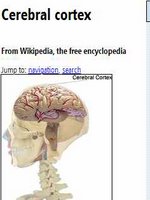Mobilizing The Web
 Most of today's new mobile phones have the ability to browse The Web. This feature sounds great, but the final user's experience is not that great at all. There is one general reason for that. The Web has become too heavy. The pages are very rich, with lots of graphics that take ages to download over GPRS and take ages to format and display by the tiny processors powering our mobiles. And most of the pages are formatted to 1024x768 fixed screen size, so viewing them on a phone is really not an easy task.
Most of today's new mobile phones have the ability to browse The Web. This feature sounds great, but the final user's experience is not that great at all. There is one general reason for that. The Web has become too heavy. The pages are very rich, with lots of graphics that take ages to download over GPRS and take ages to format and display by the tiny processors powering our mobiles. And most of the pages are formatted to 1024x768 fixed screen size, so viewing them on a phone is really not an easy task.Phone designers try to catch with the trend by using more powerful processors and higher resolution screens (my Sp5m has graphic resolution equal to the CGA card in my first IBM PC and a processor that is 20 times faster). But still trying to view a typical web page results in something far from what is usually expected by users. Even web pages with clean design, like http://www.google.com/ have to be scrolled left and right.
XHTML is a Web standard targeted at small devices. Potentially it allows creating a light formatted content, ready for the mobile browsers. But it has not captured a meaningful market, probably because not many web designers care to prepare a special versions of their sites pointing at relatively small number of XHTML devices in use. On the other hand the mobile users have not used their browsers, saying there has not been enough "light" XHTML content on the Web. Typical chicken and egg dilemma...
So here Google comes to the rescue, delivering a powerful HTML to XHTML Web translator. This clever service takes a "normal" URL as an input and outputs XHTML-formatted version of the page, translated on the fly and nicely formatted for small mobile screens. The long pages that would use your data connection too much, are even split into several smaller pages, so they display much faster on your phone. And there is even an option to get rid of the graphics. Try this yourself - the translator is available at http://www.google.com/gwt/n. Works very, very well (hey, that is what we expect from Gguys anyway). The picture on the left shows the http://en.wikipedia.org/wiki/Cerebral_cortex page displayed on my phone. Notice there is no horizontal scroll bar, so to read this you only need to navigate up and down.
The same translator engine is used for the recently introduced Mobile Personalized Home, a service that brings the Google personal portal to your mobile phone. Of course all the links from the mobile version of the portal go through the XHTML translation service, so any further page you navigate to is already translated. Very well engineered indeed. And very convenient to use. Suddenly the mobile Web is here...
But for Google, this is just another information-gathering engine. Once you start using it, the Google Brain will learn all the patterns you follow while browsing the Web. Your starting points, the links you follow, when, where and for how long. The Google is still an infant. Well... may be a toddler... It learns. Reads the books and watches your preferences and your habits. One day it will know everything about us and about the world we live in. And the day it starts understanding what it knows, will be the day when it starts to rule the world. Google's target is to become the first AI (Artificial Intelligence) creature on the Planet. They already have the most powerful computing infrastructure. They have gathered most of the information available on Earth. And there are more and more efforts (like the book scanning project - "We are not scanning all these books to be read by people. We are scanning them to be read by an AI.") to feed the beast with more and more information.
I fully agree with Ray Kurzweil that the so - called Strong-AI (a computer program capable of upgrading its own code) will emerge from the data mining engine (like Google), not from a dedicated science lab. You cannot create an AI by design. You just have to build a structure flexible enough to gather and process the information from the senses (like the cerebral cortex). And as in the cortex, you cannot control the process of creating neuron connections. You can only provide a mechanism supporting the learning process, by positive and negative feedback. Go and read the "Brain in a matchbox" chapter on page 10 of The Quantum Brain to see what I mean.
And you cannot control the moment when the created structure becomes intelligent in the full meaning of the word. Has it happened already? Probably not yet... but I am afraid it will happen sooner than we expect.
Comments
Post a Comment